Scud XP 1 gm Injection 1's


MRP ₹173.5
(Inclusive of all Taxes)
₹26.0 Cashback (15%)
Provide Delivery Location
Online payment accepted
 Prescription drug
Prescription drugWhats That
Composition :
Manufacturer/Marketer :
Consume Type :
Expires on or after :
Return Policy :
About Scud XP 1 gm Injection
Scud XP 1 gm Injection belongs to the class of medications called ‘antibiotics’ used to treat bacterial infections. Bacterial infections are caused by the multiplication of harmful bacteria inside or on the body. These harmful bacteria produce chemicals known as toxins, which can damage tissue and make you sick. Symptoms of bacterial infection vary depending on the organ affected by bacteria.
Scud XP 1 gm Injection is a combination of two medicines: Cefepime and Tazobactam. Cefepime is a cephalosporin antibiotic. It has bactericidal action (kills bacteria). It works by preventing the formation of the cell wall (the outer protective layer of bacteria, which is essential for its survival) by preventing protein synthesis. Tazobactam is a beta-lactamase inhibitor. It can improve the spectrum of antibacterial action by inhibiting the action of beta-lactamase. Beta-lactamase is an enzyme produced by bacteria that can destroy antibiotics (cefotaxime). Scud XP 1 gm Injection is only used to treat bacterial infections and is not recommended for viral infections.
Scud XP 1 gm Injection will be administered by a healthcare professional; do not self-administer. The common side effects of Scud XP 1 gm Injection are pain and swelling at the injection site and skin rash. These side effects are usually mild and temporary. However, if any of these side effects persist or get worse, inform your doctor immediately.
It is not recommended to take Scud XP 1 gm Injection if you are allergic to penicillin, any cephalosporin antibiotic, or its contents. Before taking Scud XP 1 gm Injection, inform your doctor if you have kidney problems, diabetes, gastrointestinal problems, especially colitis (inflammation of the large intestine), or use other antibiotics. Do not discontinue or abruptly stop using Scud XP 1 gm Injection as it may lead to antibiotic resistance (bacteria become resistant to antibiotics). This medicine is not recommended in children aged less than two years. Scud XP 1 gm Injection should be used with caution in pregnant women, breastfeeding mothers and elderly people. Scud XP 1 gm Injection may interact with alcohol. Scud XP 1 gm Injection may not affect your ability to drive.
Uses of Scud XP 1 gm Injection
Directions for Use
Key Benefits
Scud XP 1 gm Injection contains Cefepime and Tazobactam. Cefepime is a cephalosporin antibiotic, whereas Tazobactam is a beta-lactamase inhibitor. Scud XP 1 gm Injection has broad-spectrum activity and is effective against both gram-positive and gram-negative bacteria. It makes the drug effective in multiple moderate to severe bacterial infections such as urinary tract infections (UTI), skin infections, intra-abdominal infections, lower respiratory tract (lung) infections such pneumonia (inflammation of the air sacs present in lungs) and bronchitis (inflammation of the bronchi), septicemia (including infections of the bloodstream), and empiric treatment in febrile neutropenic patients (development of fever in patients with low neutrophil count).
Storage
- Drink water or other clear fluids.
- To prevent worsening of pain, limit intake of tea, coffee, or alcohol.
- Include bland foods like rice, toast, crackers, and rice in your diet.
- Avoid lying down immediately after eating as it may cause indigestion or heartburn.
- Avoid acidic and spicy food as it may cause indigestion.
- Confusion is a major psychotic disorder that needs immediate medical attention.
- Acknowledge your experience and put effort to control confusion.
- Avoid smoking and alcohol intake as it can worsen the condition and increase your confusion.
- Practice meditation and yoga to avoid anxiety, which can be one of the leading causes.
- Talk to your dietician and consume food that can improve your mental health.
- Rest well; get enough sleep.
- Wear comfortable layers of clothes and get to a warm place.
- Drink warm fluids like coffee, tea or hot chocolate.
- Warm up using a blanket or heating pad.
Drug Warnings
Scud XP 1 gm Injection should be used with caution in patients with kidney impairment. There is a risk of serious adverse events such as confusion, hallucinations, stupor (a state of near-unconsciousness), and seizures (fits). Scud XP 1 gm Injection may cause Clostridium difficile-associated diarrhoea (CDAD), ranging from mild diarrhea to fatal colitis (inflammation of the large intestine). If CDAD is suspected or confirmed, the doctor may discontinue therapy and advise appropriate fluid and electrolyte management, protein supplementation, and antibiotic therapy to treat CDAD. A Scud XP 1 gm Injection may cause positive direct Coomb’s test, which indicates antibodies against red blood cells. So, it is necessary to let your doctor know that you are taking this medicine before undergoing laboratory tests. Do not discontinue or abruptly stop the medication as it may lead to antibiotic resistance, a condition in which bacteria become resistant to antibiotics. Scud XP 1 gm Injection may cause superinfection (additional infection caused by other microbes) on prolonged use.
Drug-Drug Interactions
Drug-Drug Interactions
Login/Sign Up
Taking the cholera vaccine after or along with Scud XP 1 gm Injection may reduce the activity of the vaccine.
How to manage the interaction:
Although taking Scud XP 1 gm Injection and Cholera, live attenuated together can evidently cause an interaction, it can be taken if your doctor has suggested it. Make sure to inform the doctor if you are on Cholera vaccine dose or you have already taken it. You should wait at least 14 days after finishing your antibiotic treatment before receiving the cholera vaccine in order to ensure an appropriate immune response. In case of any unusual side effects, consult a doctor. Do not stop using any medications without a doctor's advice.
Taking the cholera vaccine after or along with Scud XP 1 gm Injection may reduce the activity of the vaccine.
How to manage the interaction:
Although taking Scud XP 1 gm Injection and Cholera vaccines together can evidently cause an interaction, it can be taken if your doctor has suggested it. Make sure to inform the doctor if you are on Cholera vaccine dose or you have already taken it. You should wait at least 14 days after finishing your antibiotic treatment before receiving the cholera vaccine in order to ensure an appropriate immune response. In case of any unusual side effects, consult a doctor. Do not stop using any medications without a doctor's advice.
Drug-Food Interactions
Drug-Food Interactions
Login/Sign Up
Diet & Lifestyle Advise
- Probiotics should be taken after taking the full course of Scud XP 1 gm Injection to restore some healthy bacteria in the intestines that may have been killed. Taking probiotics after antibiotic treatment can reduce the risk of antibiotic-associated diarrhoea. Certain fermented foods like yogurt, cheese, sauerkraut, kombucha and kimchi can help restore the intestine's good bacteria.
- Include more fiber-enriched food in your diet, as it can be easily digested by your gut bacteria, which helps stimulate their growth. Thus, fiber-rich foods may help restore healthy gut bacteria after a course of antibiotics. Whole grains like whole-grain bread, brown rice should be included in your diet.
- Avoid alcoholic beverages can make you dehydrated and also affect your sleep. This can make it harder for your body to aid the antibiotic in fighting off infections.
Side Effects of Scud XP 1 gm Injection
- Pain at the injection site
- Swelling at the injection site
- Skin rash
- Diarrhea
- Nausea
- Vomiting
- Headache
Habit Forming
Therapeutic Class
All Substitutes & Brand Comparisons
RX
Out of StockNot for online saleQ-Pime 1.125 gm Injection 1's
Quality Pharma
₹360
(₹324.0 per unit)
107% COSTLIERRX
Not for online saleEPIME TZ 1GM+125MG INJECTION
Unimed Technologies Ltd
₹389
(₹350.1 per unit)
124% COSTLIERRX
Out of StockNot for online salePimetum 1.125 gm Injection 1's
Medimark Biotech
₹410
(₹369.0 per unit)
136% COSTLIER
Product Substitutes
Drug-Diseases Interactions
Drug-Diseases Interactions
Login/Sign Up
FAQs
Scud XP 1 gm Injection is used to treat bacterial infections. It contains Cefepime and Tazobactam. Cefepime reduces the infection by inhibiting bacterial growth. It disrupts the formation of the cell wall (outer layer), which is essential for bacteria's survival. Tazobactam inhibits the action of beta-lactamase, an enzyme produced by the bacteria to destroy antibiotics (cefepime).
The common side-effects of Scud XP 1 gm Injection are pain and swelling at the injection site, diarrhea, nausea, vomiting, headache and skin rash. These side-effects are usually mild and temporary. However, inform your doctor immediately if any of these side-effects persist or get worse.
In individuals who have kidney problems, colitis (inflammation of the intestine), and diabetes, Scud XP 1 gm Injection should be used with caution as this medicine may worsen the condition.
Scud XP 1 gm Injection may cause diarrhoea like most of the antibiotics. So, if you find blood in stools (tarry stools) or experience severe diarrhoea, consult your doctor immediately. Taking plenty of fluids may help in preventing dehydration. Do not take any medicine on your own to treat diarrhoea.
People allergic to penicillin should not take Scud XP 1 gm Injection as they may develop cross-sensitivity (sensitivity to drugs with similar structures). Scud XP 1 gm Injection contains cefepime, which has a similar structure to that of penicillin.
Drug-Drug Interactions Checker List
- STREPTOMYCIN
- NEOMYCIN
- GENTAMICIN
- PROBENECID
Special Advise
- Scud XP 1 gm Injection may cause positive Coomb’s test, increase liver enzymes, alter red blood cell count, decrease phosphorus and cause abnormal prothrombin time (PT) and partial thromboplastin time (PTT) (abnormal PT and PTT indicate abnormal blood clotting). So, it is necessary to let your doctor know that you are taking Scud XP 1 gm Injection before undergoing laboratory tests.
- If you are taking aminoglycoside antibiotics such as streptomycin and gentamicin, your kidney function should be regularly monitored.
Disease/Condition Glossary
Bacterial infections: A bacterial infection is a condition in which harmful bacteria enter, multiply, and infect the body. It can target any organ of the body and multiply very quickly. Many give off chemicals called toxins, which can damage tissue and make you sick. Bacterial infections vary from minor illnesses (like sore throat and ear infections) to severe brain infections (like meningitis and encephalitis). When you get infected with bacteria, you can experience generalized symptoms, like fevers, chills, and fatigue. Few harmful bacteria that commonly cause infections include Streptococcus, Staphylococcus, and E. coli. Anyone can get a bacterial infection, but people with a weak immune system or taking immunosuppressive medicines like steroids are more prone to infections.

Have a query?
Buy best Infections & Infestation products by
Cipla Ltd
Macleods Pharmaceuticals Ltd
Alkem Laboratories Ltd
Lupin Ltd
Abbott India Ltd
Sun Pharmaceutical Industries Ltd
Mankind Pharma Pvt Ltd
Micro Labs Ltd
Aristo Pharmaceuticals Pvt Ltd
FDC Ltd
Intas Pharmaceuticals Ltd
Glenmark Pharmaceuticals Ltd
Ipca Laboratories Ltd
Torrent Pharmaceuticals Ltd
Zydus Healthcare Ltd
Biochem Pharmaceutical Industries Ltd
Zuventus Healthcare Ltd
United Biotech Pvt Ltd
Hetero Drugs Ltd
Emcure Pharmaceuticals Ltd
Alembic Pharmaceuticals Ltd
Indoco Remedies Ltd
Fusion Health Care Pvt Ltd
Dr Reddy's Laboratories Ltd
Leeford Healthcare Ltd
Cadila Healthcare Ltd
Wockhardt Ltd
Zydus Cadila
GlaxoSmithKline Pharmaceuticals Ltd
Morepen Laboratories Ltd
Blue Cross Laboratories Pvt Ltd
Cadila Pharmaceuticals Ltd
Converge Biotech Pvt Ltd
Elder Pharmaceuticals Ltd
Hetero Healthcare Pvt Ltd
Pfizer Ltd
AAA Pharma Trade Pvt Ltd
Gufic Bioscience Ltd
Mylan Pharmaceuticals Pvt Ltd
Corona Remedies Pvt Ltd
Wallace Pharmaceuticals Pvt Ltd
Apex Laboratories Pvt Ltd
Medishri Healthcare Pvt Ltd
Akumentis Healthcare Ltd
Alniche Life Sciences Pvt Ltd
Hegde & Hegde Pharmaceutica Llp
Veritaz Healthcare Ltd
Ranbaxy Laboratories Ltd
Koye Pharmaceuticals Pvt Ltd
Shreya Life Sciences Pvt Ltd
Overseas Health Care Pvt Ltd
Biocon Ltd
Indchemie Health Specialities Pvt Ltd
Medley Pharmaceuticals Ltd
Brinton Pharmaceuticals Ltd
J B Chemicals & Pharmaceuticals Ltd
Unifaith Biotech Pvt Ltd
Ajanta Pharma Ltd
Biochemix Health Care Pvt Ltd
Natco Pharma Ltd
Samarth Life Sciences Pvt Ltd
Unichem International
Laborate Pharmaceuticals India Ltd
Unipark Biotech Pvt Ltd
Zymes Bioscience Pvt Ltd
Indiabulls Pharmaceuticals Pvt Ltd
Neon Laboratories Ltd
Vasu Organics Pvt Ltd
DR Johns Lab Pharma Pvt Ltd
East West Pharma India Pvt Ltd
La Renon Healthcare Pvt Ltd
Medgen Drugs And Laboratories Pvt Ltd
Novartis India Ltd
Canixa Life Sciences Pvt Ltd
Icarus Health Care Pvt Ltd
Lincoln Pharmaceuticals Ltd
Celon Laboratories Pvt Ltd
Concept Pharmaceuticals Ltd
Klm Laboratories Pvt Ltd
Nicholas Piramal India Ltd
Systopic Laboratories Pvt Ltd
Yuventis Pharmaceuticals
Capital Pharma
German Remedies Ltd
Pristine Pearl Pharma Pvt Ltd
Unison Pharmaceuticals Pvt Ltd
Aurz Pharmaceutical Pvt Ltd
Clover Health Care Pharma
Kepler Healthcare Pvt Ltd
Allites Life Sciences Pvt Ltd
Auspharma Pvt Ltd
Intra Life Pvt Ltd
Jolly Healthcare
Linux Laboratories Pvt Ltd
Ozone Pharmaceuticals Ltd
Cachet Pharmaceuticals Pvt Ltd
Comed Chemicals Ltd
Delcure Life Sciences Ltd
Fresenius Kabi India Pvt Ltd
Khandelwal Laboratories Pvt Ltd
Alcohol
Safe if prescribed
Scud XP 1 gm Injection may interact with alcohol. Consult your doctor before consuming any alcohol.
Pregnancy
Consult your doctor
Scud XP 1 gm Injection is a category B medicine and may not cause harmful effects to the unborn baby. However, it should be used in pregnant women only if prescribed by a doctor.
Breast Feeding
Consult your doctor
Scud XP 1 gm Injection may pass into breast milk in small amounts. So, caution should be exercised when given to breastfeeding mothers.
Driving
Safe if prescribed
Scud XP 1 gm Injection may not affect your ability to drive.
Liver
Consult your doctor
Scud XP 1 gm Injection should be used with caution in patients with live diseases. The dose may have to be adjusted by your doctor.
Kidney
Consult your doctor
Scud XP 1 gm Injection should be used with caution in patients with kidney diseases. The dose may have to be adjusted by your doctor.
Children
Safe if prescribed
Scud XP 1 gm Injection is not recommended for children below two years of age. It can be used safely in children above two years. Please consult your doctor for more information.







